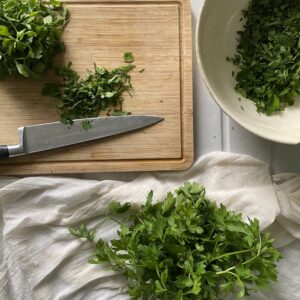In Lebanon tabbouleh has almost mythical status. When eating with Lebanese friends and family, or at a restaurant, everyone takes immense pride in this salad. Each Lebanese household, will give it their own special twist, making it uniquely theirs. Shorkk’s tabbouleh comes courtsey of Barbara Massaad from her cookbook Mezze.
Probably the most misunderstood element of this salad is its main ingredient. It’s parsley, not bulgur wheat! We’ve seen recipes online where the suggested 200g of bulgur wheat drew loud exclamations from members of the shorkk household! As Barbara Massaad, says “Grain salads that pretend to be tabbouleh are simply an insult to the real thing!”
Barbara Massaad admits it does take a bit of time to prepare the parsley. If you have a Turkish, Kurdish, or “Middle Eastern” shop near you, they’ll have large bunches of parsley so you can check the leaves are tender. Barbara proposes washing the bunches then leaving them to dry in a colander or on a tea towel, so there’s no water left on them (the resulting mush will have you regretting your impatience!) Only then do you carefully pick out the stems and put them together in several small bunches. Then comes the slicing, which Kamal Mouzawak, founder of Beirut’s famous farmers’ market, Souk el Tayeb, sees as essential. Sharp knife in hand, hold the bunch firmly so that you can slice finely. The smell of the sliced leaves gets your tastes buds going, and as the leaves aren’t bruised, they don’t turn mushy. Once you’ve sliced the mint, cover with a cloth so that it blacken. Anissa Helou, the chef and food writer, recommends using fine bulgur wheat, the darker variety if you can find it.
Good tasting tomatoes are essential, as is the quality of your extra virgin olive oil. Too pungent and green, and it will make the salad an effort to eat. Zejd’s mild extra virgin olive oil doesn’t interfere with the riot of tastes from this iconic Lebanese salad, making it a joy to eat!
serves 4
ingredients
2 large bunches of flat leaf parsley (about 200g) finely sliced
a small bunch of mint (about 25g) leaves stripped from the stems, finely chopped
4 ripe tomatoes, firm
3 spring onions, finely chopped
1/2 tsp ground allspice
1/2 tsp fine sea salt
25g fine cracked bulgur wheat, (if you can only find the coarse variety, blitz if for a few seconds in a food processor)
1 lemon, juice of
100ml Zejd’s extra virgin olive oil
White cabbage leaves torn, or romain lettuce leaves to serve.
method
- Wash the parsley, picking out the tired bits, and gather together to make a couple of smaller bunches (to help with the slicing later). Shake off the excess water, and leave to dry on a tea towel.
- Making sure the parsley is dry, and that your knife is sharp, hold the bunch in one hand and slice rather than chop. This releases the powerful aroma of the parsley and doesn’t bruise the leaves. Transfer to the salad bowl.
- Chop the mint leaves, making sure that you don’t over handle them as they will go black. Add to the salad bowl and cover with a tea towel.
- Again with a sharp knife, dice the tomatoes. Easily done if you slice the tomatoes into rounds, then cut vertically and horizontally. Set aside.
- Slice the spring onions finely, which can be easier than chopping them. Add them to a small bowl and sprinkle over the salt and the ground allspice. Mix well.
- Wash the cracked bulgur wheat quickly under cold water, and strain. Tip this into a small bowl add the lemon juice and leave to soak for about 5 minutes.
- Then add the bulgur mixture, and the tomatoes to the parsley and mint. Just before you serve, add the oil and mix well. Taste and check to see if you need more salt, lemon or oil. The salad shouldn’t be swimming in liquid but glistening. If you feel like adding a hint of heat, a touch of Aleppo pepper mixed into the salad adds an interesting kick.
Tear up some white cabbage leaves or use romain lettuce leaves so that people can scoop up the tabbouleh and eat it with their fingers! Delicious served alongside lamb shawarma or roast lamb.
